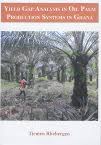Plant Production Systems
Projects
UKRI GCRF Trade, Development and the Environment Hub (2019-2025)
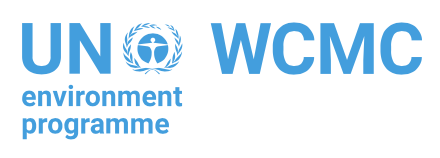 |
The UKRI GCRF Trade, Development and the Environment Hub studies how different systems of trade have affected biodiversity from a biophysical, social, political and economic point of view, and seeks to trace the impact of the trade throughout supply chains - from supplier to consumer countries via trading companies. As well as feeding into public policy advice, this research will help companies understand their products’ true environmental impact all the way back to the raw materials. The Hub will work closely with international and regional trade bodies, charities and corporate partners to design targeted recommendations for the public policy and corporate spheres, ensuring impact of the research and creating sustainable change. Within this global project, WUR implements a component on understanding where are trade-offs, risks and opportunities for biodiversity and livelihoods from the development of cocoa and oil palm in the Congo Basin. Contact persons: Marieke Sassen and Ken Giller |
GYGA oil palm Indonesia Phase I (2018-2019) and Phase II (2019-2023)
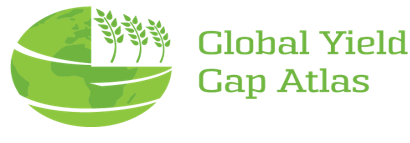 |
Wageningen University and University of Nebraska Lincoln lead a NORAD funded project with Indonesian Oil Palm Research Institute (IOPRI) and Indonesian agency for agricultural research and development (IAARD). The objective is to assess yield gaps in smallholder and commercial oil palm plantations in 22 locations representing all oil palm cultivation areas in mineral soils in Indonesia. In phase I (2018-2019) the potential and water limited potential yields were simulated based on soil and weather data using PALMSIM. These were compared with actual yield data collected by IOPRI. In the second phase (2019-2023) the project works in 6 locations in each of which they follow daily oil palm related practices and yields of 200 independent smallholders. In each location seven paired demonstration plots are installed to compare vegetative development and yields of plots with best management practices with plots subject to farmers practices. The objectives are to show smallholders how to improve their yields and to investigate the relative contribution of different practices to the existing yield gaps. From the PPS group, the project is coordinated by Maja Slingerland. Willem Hekman and Rob van der Beuken worked in the first phase of the project. In the second phase, Mohamed Jabloun joined the team. Project output:
|
SEnSOR (Socially and Environmentally Sustainable Oil Palm Research; 2015 - 2021)
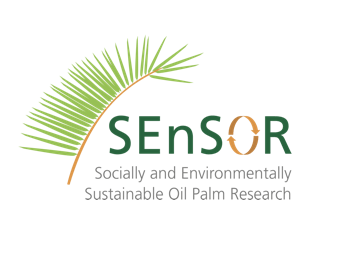
|
The SEnSOR programme is investigating sustainability of the palm oil sector in three main areas: Biodiversity, Environment (including soil, water and greenhouse gases) and Society (including community and labour rights, and livelihoods). The programme is facilitated by the South East Asia Rainforest Research Partnership (SEARRP) and funded by the RSPO. Wageningen University, Van Hall Larenstein and the different Indonesian NGOs and universities investigate which factors can explain the likeliness of smallholders to being certified. Past research focused on identification of constraints, costs and benefits to certification, and motives of smallholders to expand or intensify, all in Indonesia. Current research focuses on heterogeneity among independent oil palm smallholders in Central Kalimantan. We examine pre and post certification conditions of different types of independent oil palm smallholders in relation to their socio-economic background, plantation management and yield, and ecosystems services in and around smallholders’ plantations, to understand how this shapes their prospects for sustainability certification. By obtaining a better understanding of what characteristics enable certification, and which groups are likely to be left behind, we can better understand the impact that RSPO is having on improving livelihoods and sustainable production for smallholders, and identify what can be done to improve engagement with those groups who are not currently likely to undergo certification. Project output:
Contact persons: Rosa de Vos and Maja Slingerland |
ANGIN I (2018-2019) and II (2020-21)
 |
KNAW funded two projects to support partnership between the Netherlands and Indonesia. ANGIN I was a partnership between Leiden University, Wageningen University and several activist NGOs that investigated oil palm related conflicts. PPS proposed intercropping as a means to mediate between oil palm companies that favor oil palm expansion and smallholders that aim to preserve their livelihood options. ANGIN II is a partnership between Wageningen university and Bogor Agricultural University (IPB), Indonesia with the title: “Identifying small wins towards transformational change of the Indonesian palm oil sector”. The aim is to investigate how Indonesian Sustainable Palm Oil certification (ISPO) can be made more attractive/better fit to oil palm smallholders and how ISPO can be better positioned within the debate on sustainable palm oil in international trade (RED+) especially between Indonesia and the European Union. PPS will participate in workshops with IPB and Indonesian policy makers on using the small wins framework to investigate whether intercropping and jurisdictional approach can contribute to increase acceptability of ISPO as a means to deal with wicked problems. Two scientific papers are foreseen. |
K2K Malaysia (2017-2020)
 |
Wageningen University works with Malaysian Oil Palm Board (MPOB) and Van Hall Larenstein on increasing sustainability of oil palm production and processing as the knowledge to knowledge (K2K) component of the SCOP partnership between the governments of Netherlands and Malaysia. The objective of the project is to enhance resource use efficiency (land, water, nutrients, carbon) in field and mill. The roles of PPS are (1) to use PALMSIM to assess the impact of climate change on potential and water limited potential yields; (2) to investigate oil palm integration with black pepper, with pine apple and with livestock; (3) to investigate the effect of potassium deficiency on drought resistance;(4) to assess the most sustainable use of oil palm biomass in the field; (5) to assess possibility of starch extraction from the trunk after felling (with Wageningen Biobased Research). The project resulted in a number of MSc theses (by Adrien Francois Migeon, Sanne van Leeuwen, Natascha Grinnell and Eva Meijers) and in an EFTRN paper on intercropping. All these papers are available in the publications tab. Project output:
|
K2K Colombia (2019-2020)
 |
Wageningen University works with CENIPALMA Colombia on increasing sustainability of oil palm production and processing as the knowledge to knowledge (K2K) component of the collaboration between the governments of the Netherlands and Colombia. The objective is to increase circularity of resource use on the field and in the mill. Land savings can be achieved by intensification of production on current land and by land sharing. Therefore the role of PPS is (1) to calibrate and validate PALMSIM for Colombia to assess potential and water limited potential yield for different oil palm growing areas as benchmarks for intensification; (2) to parameterize PALMSIM for a hybrid variety which is resistant against bud rot to assess differences in potential and water limited potential yields compared to current variety; (3) to investigate whether oil palm integration with crops or livestock occurs in Colombia and the contribution of such systems to for instance ecological and income resilience against bud rot or other shocks; and (4) to asses most efficient use of empty fruit bunches (with Wageningen Biobased Research). Project output:
|
Consultancy on intercropping in Sierra Leone
 |
Project description Project output:
|
Better Management Practices in Indonesian smallholder oil palm plantations (2013-2019)
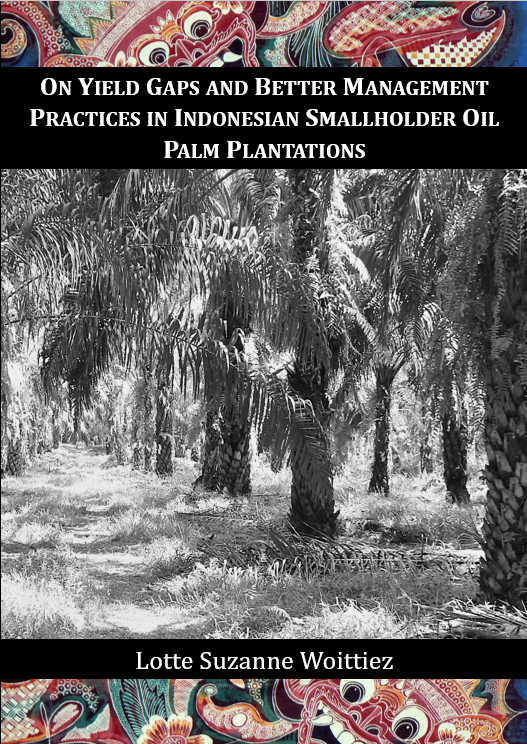 |
From 2013 to 2019, we collaborated with partners SNV, IDH, K+S Kali and Johnson and Johnson on a research project on (better) management practices in Indonesian smallholder oil palm plantations. The project investigated the agronomic practices that smallholders implemented, assessed the nutritional status of plantations, and identified bottlenecks which stopped farmers from producing more bunches. In addition to the exploratory research on farmers' practices we carried out a pilot in 14 smallholder oil palm plantations in Indonesia. In these fields, we implemented better oil palm management practices, with a focus on nutrient application. We recorded the yields at every harvest, took samples of the soil and leaves, and measured the vegetative growth of the palms. We also had regular discussions with the farmers about the practices that they implemented. Our better practices resulted in some significant changes (for example in palm nutrient status and in the size of the oil palm bunches) but not in significantly better yields. Three important reasons were that the participating farmers already produced good yields, that the better practices were also implemented in the control plots (even though we asked farmers not to do so) and that El Niño strongly affected the yields in 2015 and 2016. The results of the research were presented in the thesis of Lotte Woittiez, which she defended on April 10th 2019. In addition, the work resulted in many other publications which are listed below. Project output:
|
Yield gap analysis in oil palm production systems in Ghana (2015-2019)
|
|
Since the early 2000s, the area under oil palm in Ghana expanded but average fruit bunch yields remained low at ~7 t ha-1 yr-1 in 2014, resulting in large yield gaps. Despite the pressing need to increase palm oil production and improve yields, knowledge of the underlying causes of poor yields in Ghana is lacking. The objective of this project, carried out by PhD candidate Tiemen Rhebergen as part of the IPNI project "Oil Palm Best Management Practices in Ghana" (in collaboration with Tropical Crop Consultants Limited and Solidaridad), was to analyse the factors that currently limit oil palm production on plantations and smallholder farms in Ghana and to assess opportunities to increase yields with improved agronomic practices. Using land suitability evaluation methods and yield gap analysis, a framework for yield intensification with ‘Best Management Practices’ (BMP) on existing mature oil palm plantings was developed. Data was acquired from online databases, farm surveys, a three-year trial established on three plantations and twenty smallholder farms across Ghana, and an irrigation and fertilizer experiment established on a large-scale oil palm plantation in Western region, Ghana. The project resulted in the publication of several articles and the PhD thesis of Tiemen, which he defended successfully in the Wageningen aula on 12/06/2019. Project output:
|
In search of sustainable and inclusive palm oil production: The role of smallholders in Indonesia (2015-2019)
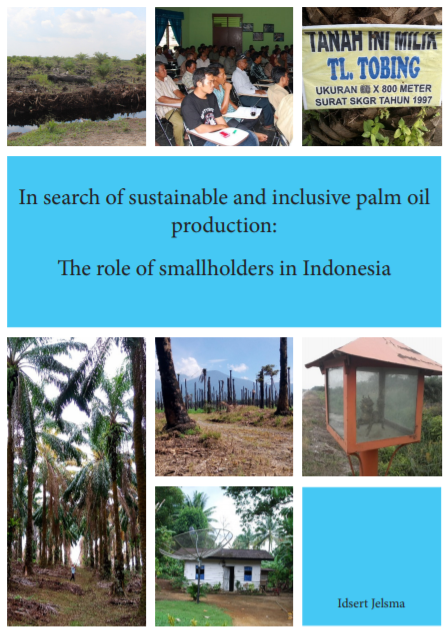 |
From 2015 until 2019, Idsert Jelsma carried out his PhD research entitled "In search of sustainable and inclusive palm oil production: The role of smallholders in Indonesia". Ken Giller, Maja Slingerland and Lotte Woittiez from the Plant Production Systems group collaborated with Idsert during his research project. Idsert's research builds on the old debate regarding the role of smallholder farmers in society and links it to the integration of smallholders into modern global value chains. Since the peak in global agro-commodity prices in 2007/08, interest in agriculture has increased again among policymakers and in the private sector. Modern global value chains provide opportunities for smallholder farmers but also increasingly dictate conditions in terms of production practices, and thereby determine conditions for inclusion. The Indonesian oil palm sector provides an interesting case regarding smallholder inclusion in modern global value chains and the role they play in sustainable agro-commodity production. Palm oil production in Indonesia has thrived due to insertion in global value chains, experienced massive smallholder engagement, faces considerable sustainability challenges and illustrates the impacts sustainability initiatives can have on smallholders. It thus provides a promising case to further explore the nexus of sustainable and inclusive development, smallholder agriculture and policy. The primary aim of the research was to advance the understanding of how the oil palm sector can be made more sustainable and inclusive. It did so by exploring independent and organized oil palm smallholders in Sumatra, explaining their emergence and performance, and discussing strategies to improve their performance. Whereas the smallholder oil palm sector clearly has its unique characteristics, Idsert's research unpicks some stereotypical views on smallholders and highlights the dynamics impacting farmers’ organizations over time, and thereby contributes to debates on the future of farming. On 30/08/2019 Idsert successfully defended his PhD thesis at Utrecht University. Project output to which PPS contributed: |
Oil palm production in Indonesia: carbon footprint and diversification options (2013-2019)
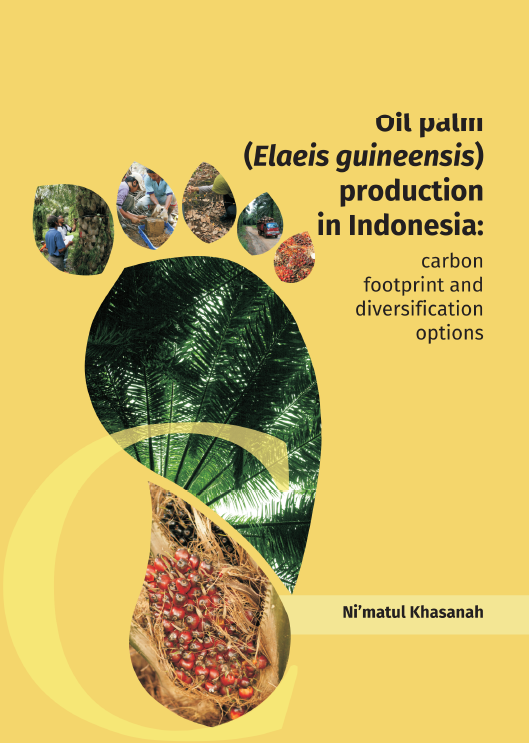 |
From 2013 to 2019, Ni'matul Khasanah carried out her PhD research at ICRAF in Bogor, under the supervision of Meine van Noordwijk and Maja Slingerland of the PPS group. The objectives of the project were (1) to estimate the carbon footprint of palm oil production in Indonesia when it is used as biofuel and express it as CO2 equivalent and emissions saving, and (2) to explore mixed oil palm systems as diversification strategy to increase farmer benefit and to reduce the carbon footprint. Project output:
|
SUSPENSE project: Towards Environmentally Sustainable and Equitable Palm Oil (2012-2018)
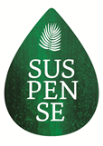 |
Wageningen University funded through its interdisciplinary research and education fund (INREF) a project called: Towards Environmentally Sustainable and Equitable Palm Oil: Promoting sustainable pathways by exploring connections between flows, networks and systems at multiple levels (2012-2018). The two main objectives of this five year research program were (1) to identify sustainable pathways for the production, processing and governing of palm oil and (2) to enable different stakeholders to contribute to a more environmentally sustainable and equitable palm oil sector in a science-based and concerted way. Eight PhD-students performed a multi-disciplinary and multi-level research of the palm oil commodity chain, with senior researchers and a post-doc contributing to integration at program level. Research activities of the entire production chain took place in Indonesia and Thailand, but also included analysis of transboundary commodity flows and global governance arrangements and how these contribute to more or less environmentally sustainable and equitable palm oil. Partners were local universities and Oxfam-Novib. Within the PPS group, Siriluk Somnuek conducted her PhD research on oil palm expansion in Northern Thailand where climate and infrastructure are not conducive for oil palm sector development. Sakti Hutabarat conducted his PhD research on costs and benefits of certification in Riau, Indonesia. Master students and BSc students studied a wide range of topics, including farmer organisations which are prerequisites for certification, water balances in Northeast Thailand. Project output:
|

